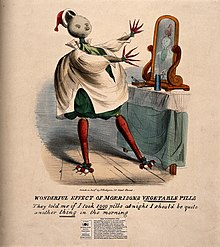Integrative medicine
| Alternative medicine | |
|---|---|
| unconventional medicine, unorthodox medicine, heterodox medicine, complementary medicine, integrative medicine, new-age medicine, mumbo jumbo | |

"They told me if I took 1000 pills at night I should be quite another thing in the morning", an early 19th-century satire on Morison's Vegetable Pills, an alternative medicine supplement.
|
Alternative medicine or fringe medicine are practices claimed to have the healing effects of medicine but are disproven, unproven, impossible to prove, or only harmful; and where scientific consensus is that the practice does not or can not work. Alternative therapies or diagnoses are not part of medicine or science-based healthcare systems. Alternative medicine consists of a wide variety of practices, products, and therapies—ranging from those that are biologically plausible but not well tested, to those with known harmful and toxic effects. Contrary to popular belief, significant expense is paid in testing alternative medicine, including over $2.5 billion spent by the United States government, with almost none showing any effect beyond that of false treatment. Perceived effects of alternative medicine may be caused by placebo, decreased effects of functional treatment (and therefore also decreased side-effects), and regression toward the mean where improvement that would have occurred anyway is credited to alternative therapies. Alternative medicine is not the same as experimental medicine.
Alternative medicine has grown in popularity and is used by a significant percentage of the population in many countries. While it has extensively rebranded itself: from quackery to complementary or integrative medicine—it promotes essentially the same practices. Newer proponents often suggest alternative medicine be used together with functional medical treatment, in a belief that it "complements" (improves the effect of, or mitigates the side effects of) the treatment. However, significant drug interactions caused by alternative therapies may instead negatively influence treatments, making them less effective, notably cancer therapy. Despite it being illegal to market alternative therapies for any type of cancer treatment in most of the developed world, many cancer patients use them.
Alternative medical diagnoses and treatments are not included in the science-based curriculum taught in medical schools, and are not used in medical practice where treatments are based on scientific knowledge. Alternative therapies are often based on religion, tradition, superstition, belief in supernatural energies, pseudoscience, errors in reasoning, propaganda, or fraud. Regulation and licensing of alternative medicine and health care providers varies between and within countries.
...
Wikipedia
